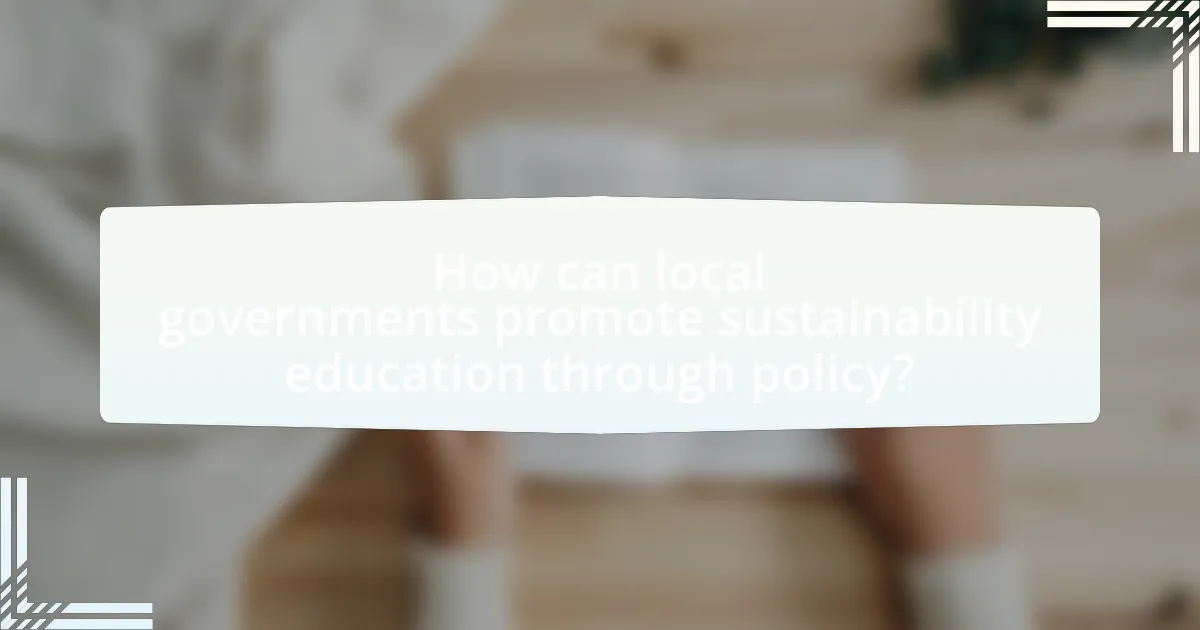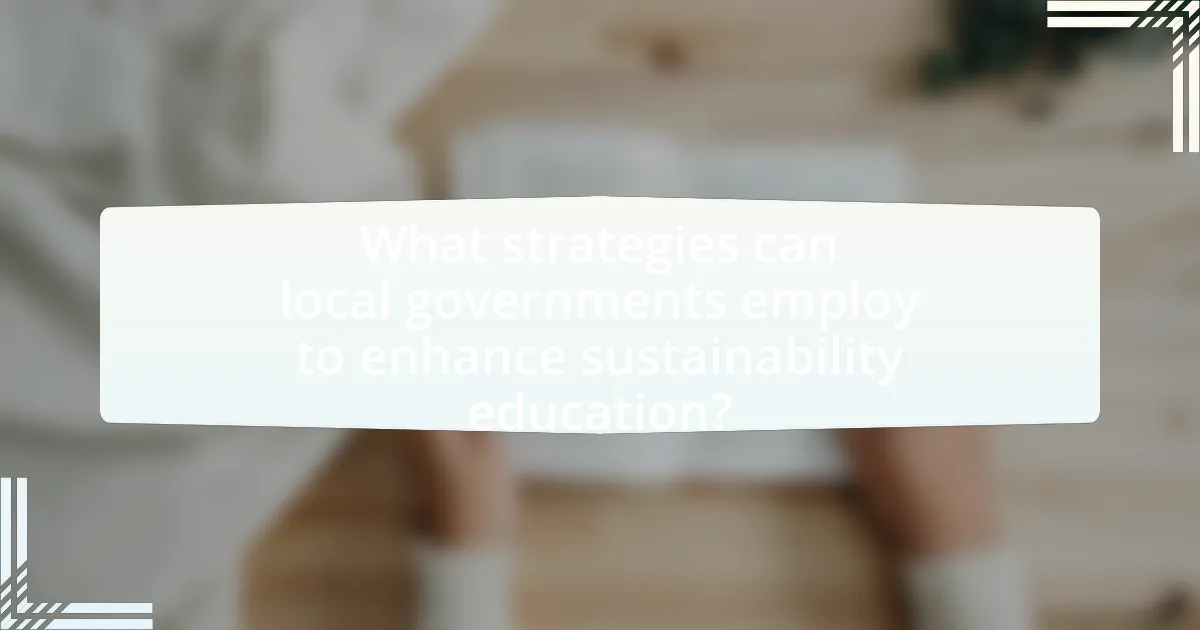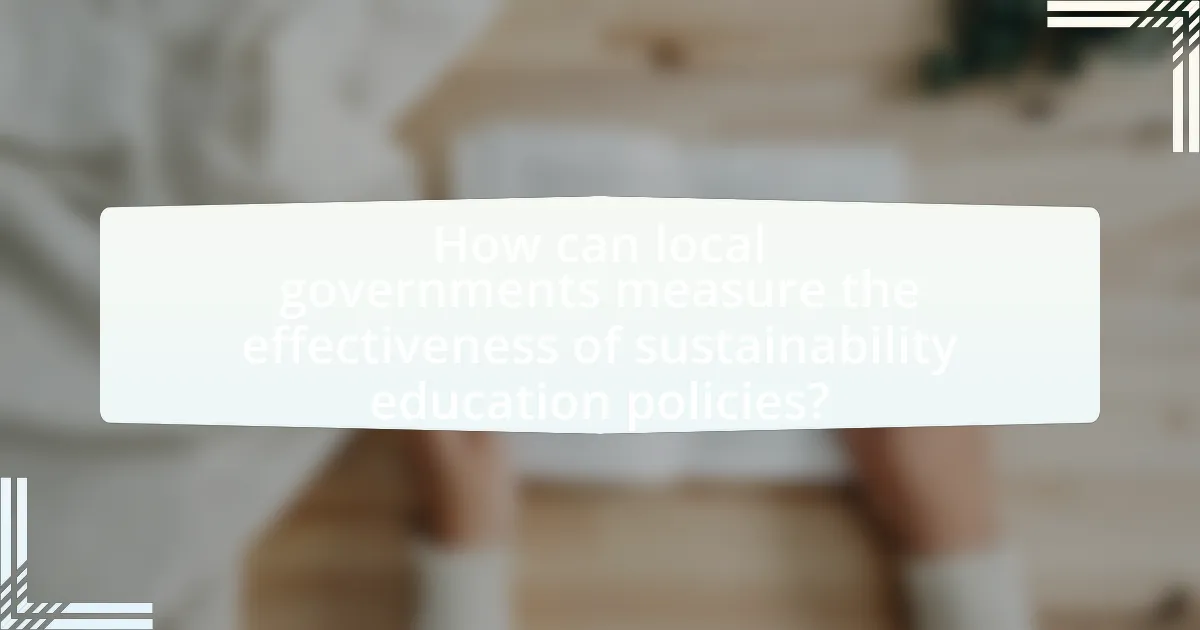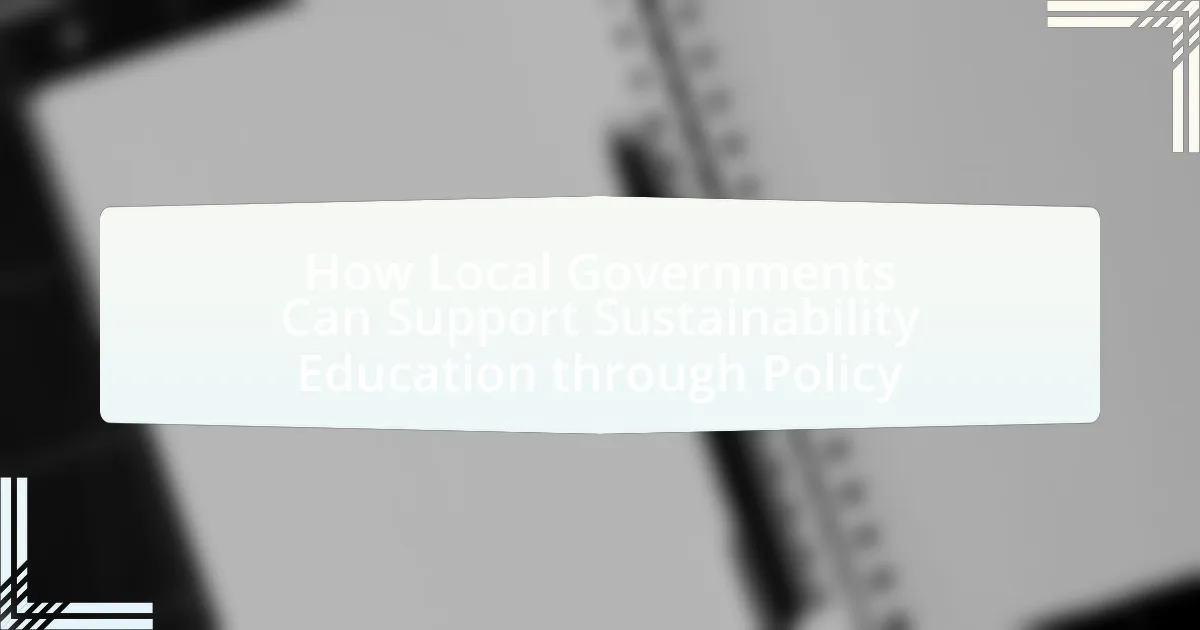Local governments play a crucial role in promoting sustainability education through policy by integrating sustainability principles into local curricula and community programs. Key strategies include establishing partnerships with educational institutions, funding environmental education initiatives, and mandating the inclusion of sustainability topics in school standards. The article explores the impact of these policies on local educational institutions, the role of community organizations in implementation, and the long-term benefits for local economies. Additionally, it discusses practical steps for enhancing sustainability education, common challenges faced, and the importance of community engagement in fostering a culture of sustainability.

How can local governments promote sustainability education through policy?
Local governments can promote sustainability education through policy by integrating sustainability principles into local curricula and community programs. This can be achieved by establishing partnerships with educational institutions to develop programs that focus on environmental stewardship, resource conservation, and sustainable practices. For instance, policies can mandate the inclusion of sustainability topics in school education standards, ensuring that students receive comprehensive training on these issues. Additionally, local governments can provide funding and resources for workshops, training sessions, and community outreach initiatives that raise awareness about sustainability. Evidence of effectiveness can be seen in cities like San Francisco, where policies supporting sustainability education have led to increased community engagement and improved environmental outcomes.
What are the key policies that support sustainability education?
Key policies that support sustainability education include the integration of sustainability into school curricula, funding for environmental education programs, and the establishment of partnerships between educational institutions and local governments. These policies ensure that sustainability concepts are taught across various subjects, providing students with a comprehensive understanding of environmental issues. For instance, the U.S. Department of Education promotes the inclusion of sustainability in educational standards, which encourages schools to adopt relevant teaching practices. Additionally, local governments can allocate resources to support community-based sustainability initiatives, enhancing practical learning experiences for students.
How do these policies impact local educational institutions?
Local government policies supporting sustainability education significantly enhance local educational institutions by integrating environmental curricula and promoting resource allocation for sustainability initiatives. These policies often lead to increased funding for programs focused on environmental science, allowing schools to develop specialized courses and extracurricular activities that engage students in sustainability practices. For instance, research from the National Center for Education Statistics indicates that schools with dedicated sustainability programs report higher student engagement and improved academic performance in related subjects. Additionally, such policies can foster partnerships between educational institutions and local organizations, providing students with real-world experiences and community involvement opportunities that further enrich their learning environment.
What role do community organizations play in implementing these policies?
Community organizations play a crucial role in implementing sustainability education policies by acting as intermediaries between local governments and the community. They facilitate the dissemination of information, engage residents in educational programs, and mobilize community resources to support sustainability initiatives. For instance, organizations like local environmental groups often conduct workshops and outreach programs that align with government policies, ensuring that the community understands and participates in sustainability efforts. This engagement is vital, as studies show that community involvement significantly enhances the effectiveness of sustainability education, leading to increased awareness and behavioral changes among residents.
Why is sustainability education important for local communities?
Sustainability education is crucial for local communities because it empowers individuals with the knowledge and skills necessary to make informed decisions that positively impact their environment and society. By fostering awareness of sustainable practices, communities can enhance resource management, reduce waste, and promote social equity. Research indicates that communities engaged in sustainability education initiatives experience improved environmental outcomes, such as increased recycling rates and reduced carbon footprints. For instance, a study by the National Environmental Education Foundation found that communities with strong sustainability education programs saw a 30% increase in community participation in environmental initiatives. This demonstrates that sustainability education not only informs but also mobilizes local populations towards collective action for a sustainable future.
How does sustainability education influence community behavior?
Sustainability education significantly influences community behavior by increasing awareness and promoting environmentally responsible practices. Research indicates that communities exposed to sustainability education programs exhibit higher levels of participation in recycling, conservation efforts, and sustainable transportation options. For instance, a study published in the Journal of Environmental Education found that participants in sustainability workshops were 30% more likely to adopt energy-saving measures in their homes compared to those without such education. This correlation demonstrates that informed communities are more likely to engage in behaviors that support environmental sustainability, ultimately leading to a collective positive impact on local ecosystems and resource management.
What are the long-term benefits of sustainability education for local economies?
Sustainability education provides long-term benefits for local economies by fostering a skilled workforce equipped to engage in green jobs and sustainable practices. This education enhances local economic resilience by promoting innovation in sustainable technologies and practices, which can lead to job creation in sectors such as renewable energy, sustainable agriculture, and waste management. For instance, a study by the National Renewable Energy Laboratory found that investments in renewable energy education can create thousands of jobs and stimulate local economies. Additionally, sustainability education encourages community engagement and awareness, leading to increased support for local businesses that prioritize sustainable practices, ultimately contributing to a more robust and sustainable economic framework.

What strategies can local governments employ to enhance sustainability education?
Local governments can enhance sustainability education by implementing community-based programs, integrating sustainability into school curricula, and promoting public awareness campaigns. Community-based programs, such as workshops and local sustainability initiatives, engage residents directly and foster hands-on learning experiences. Integrating sustainability into school curricula ensures that students receive education on environmental issues from an early age, which is supported by studies showing that early education leads to long-term behavioral changes regarding sustainability. Public awareness campaigns, utilizing social media and local events, can effectively disseminate information about sustainable practices, as evidenced by successful initiatives in cities like San Francisco, where public engagement has significantly increased recycling rates.
How can partnerships with educational institutions strengthen sustainability initiatives?
Partnerships with educational institutions can strengthen sustainability initiatives by leveraging research, innovation, and community engagement. Educational institutions often conduct cutting-edge research that can inform sustainable practices, such as renewable energy technologies or waste reduction strategies. For example, universities have developed programs that integrate sustainability into their curricula, fostering a new generation of environmentally conscious leaders. Additionally, collaborations between local governments and schools can facilitate community-based projects, such as tree planting or recycling programs, which enhance public awareness and participation in sustainability efforts. Evidence shows that regions with strong educational partnerships report higher rates of community involvement in sustainability initiatives, leading to measurable environmental benefits.
What types of programs can be developed through these partnerships?
Partnerships between local governments and educational institutions can develop various programs focused on sustainability education. These programs may include community workshops on sustainable practices, school curricula that integrate environmental science, and public awareness campaigns promoting sustainability initiatives. For instance, a partnership might lead to the creation of a local sustainability curriculum that aligns with state education standards, thereby enhancing student engagement in environmental issues. Additionally, local governments can facilitate internships and hands-on projects that allow students to work on real-world sustainability challenges, fostering practical skills and community involvement.
How can local governments support teacher training in sustainability education?
Local governments can support teacher training in sustainability education by providing funding for professional development programs focused on sustainability. These programs can include workshops, seminars, and certification courses that equip teachers with the necessary knowledge and skills to integrate sustainability into their curricula. For instance, the National Science Foundation has funded initiatives that enhance teacher training in environmental education, demonstrating the effectiveness of targeted financial support in improving educational outcomes. Additionally, local governments can collaborate with educational institutions and non-profit organizations to create resources and training materials that align with sustainability goals, ensuring that teachers have access to up-to-date information and best practices.
What funding opportunities are available for sustainability education programs?
Funding opportunities for sustainability education programs include federal grants, state funding initiatives, and private foundation grants. For instance, the U.S. Environmental Protection Agency offers grants specifically for environmental education projects, which can support sustainability education initiatives. Additionally, local governments may allocate budgetary resources for educational programs that promote sustainability, often through community development or environmental departments. Private foundations, such as the Kresge Foundation and the Packard Foundation, also provide funding for innovative sustainability education projects. These funding sources are essential for developing and implementing effective sustainability education programs that engage communities and foster environmental stewardship.
How can local governments access grants for sustainability initiatives?
Local governments can access grants for sustainability initiatives by identifying relevant funding opportunities through federal, state, and private sources. These grants often focus on projects that promote environmental sustainability, energy efficiency, and community resilience. For instance, the U.S. Environmental Protection Agency (EPA) offers various grant programs specifically aimed at supporting local sustainability efforts, such as the Environmental Education Grants and the Brownfields Program. Additionally, local governments can collaborate with nonprofit organizations and academic institutions to enhance their grant applications, increasing their chances of securing funding.
What role do private sector partnerships play in funding these programs?
Private sector partnerships play a crucial role in funding sustainability education programs by providing financial resources, expertise, and innovative solutions. These partnerships enable local governments to leverage private investment, which can significantly enhance the scale and impact of educational initiatives. For instance, a report by the World Economic Forum highlights that collaboration between public entities and private companies can lead to increased funding opportunities, with private sector contributions often accounting for a substantial portion of program budgets. This financial support not only helps in the development and implementation of educational materials but also fosters community engagement and awareness around sustainability issues.

How can local governments measure the effectiveness of sustainability education policies?
Local governments can measure the effectiveness of sustainability education policies by utilizing quantitative and qualitative assessments, such as surveys, pre-and post-program evaluations, and tracking behavioral changes in the community. For instance, surveys can gauge participants’ knowledge and attitudes before and after educational initiatives, while behavioral tracking can assess changes in recycling rates or energy consumption. Research indicates that programs employing these methods, like the “Green Schools” initiative, have shown a 20% increase in student engagement in sustainability practices, demonstrating the impact of effective education policies.
What metrics should be used to evaluate sustainability education outcomes?
To evaluate sustainability education outcomes, metrics such as knowledge retention, behavioral change, and community engagement should be utilized. Knowledge retention can be assessed through pre- and post-program assessments that measure participants’ understanding of sustainability concepts. Behavioral change can be tracked by monitoring actions taken by individuals or groups, such as increased recycling rates or reduced energy consumption, following educational interventions. Community engagement can be evaluated through participation rates in sustainability initiatives and feedback from participants regarding their experiences and perceived impact. These metrics provide a comprehensive framework for assessing the effectiveness of sustainability education programs.
How can feedback from the community inform policy adjustments?
Feedback from the community can inform policy adjustments by providing insights into the needs and preferences of residents, which can lead to more effective and relevant policies. For instance, local governments can gather feedback through surveys, public meetings, and social media, allowing them to understand community concerns regarding sustainability education. This direct input can highlight gaps in current policies or reveal new opportunities for initiatives that promote sustainability. Research shows that community engagement in policy-making leads to higher satisfaction and compliance rates, as evidenced by a study from the International City/County Management Association, which found that 70% of residents felt more positively about local government when they were involved in decision-making processes. Thus, integrating community feedback into policy adjustments ensures that local governments address the specific needs of their constituents, ultimately enhancing the effectiveness of sustainability education initiatives.
What best practices can local governments adopt for successful sustainability education?
Local governments can adopt best practices for successful sustainability education by implementing community engagement initiatives, integrating sustainability into school curricula, and providing accessible resources. Community engagement initiatives, such as workshops and public forums, foster collaboration and raise awareness about sustainability issues, as evidenced by the success of programs like the City of San Diego’s Climate Action Plan, which involved extensive community input. Integrating sustainability into school curricula ensures that students learn about environmental stewardship from an early age, supported by research from the National Environmental Education Foundation, which highlights the positive impact of environmental education on student engagement and academic performance. Providing accessible resources, such as online toolkits and informational materials, empowers residents to take action in their own lives, a strategy effectively utilized by the City of Portland through its sustainability resource center.
How can local governments engage citizens in sustainability education efforts?
Local governments can engage citizens in sustainability education efforts by implementing community-based programs that promote awareness and participation in sustainable practices. These programs can include workshops, informational campaigns, and partnerships with local organizations to provide resources and training on topics such as recycling, energy conservation, and sustainable agriculture. For instance, a study by the American Planning Association found that community engagement initiatives significantly increase public knowledge and participation in sustainability efforts, leading to more environmentally conscious behaviors among residents.
What are common challenges faced in implementing sustainability education policies?
Common challenges faced in implementing sustainability education policies include insufficient funding, lack of trained educators, and inadequate curriculum integration. Insufficient funding limits the resources available for developing and delivering effective sustainability education programs, as evidenced by a report from the National Education Association, which highlights that many schools struggle to allocate budgets for such initiatives. The lack of trained educators hampers the ability to effectively teach sustainability concepts, as noted in a study by the Journal of Environmental Education, which found that many teachers feel unprepared to incorporate sustainability into their lessons. Additionally, inadequate curriculum integration results in sustainability education being treated as an add-on rather than a core component, leading to fragmented learning experiences, as reported by the United Nations Educational, Scientific and Cultural Organization (UNESCO).
What are practical steps local governments can take to enhance sustainability education?
Local governments can enhance sustainability education by integrating sustainability into school curricula and community programs. This can be achieved by collaborating with educational institutions to develop programs that focus on environmental stewardship, resource conservation, and sustainable practices. For instance, the U.S. Department of Education’s Green Ribbon Schools program recognizes schools that promote sustainability, demonstrating the effectiveness of such initiatives. Additionally, local governments can provide funding for workshops and training sessions aimed at teachers and community leaders, ensuring they have the necessary tools to educate others. Implementing community awareness campaigns that highlight local sustainability efforts can further engage residents and foster a culture of sustainability.

Leave a Reply